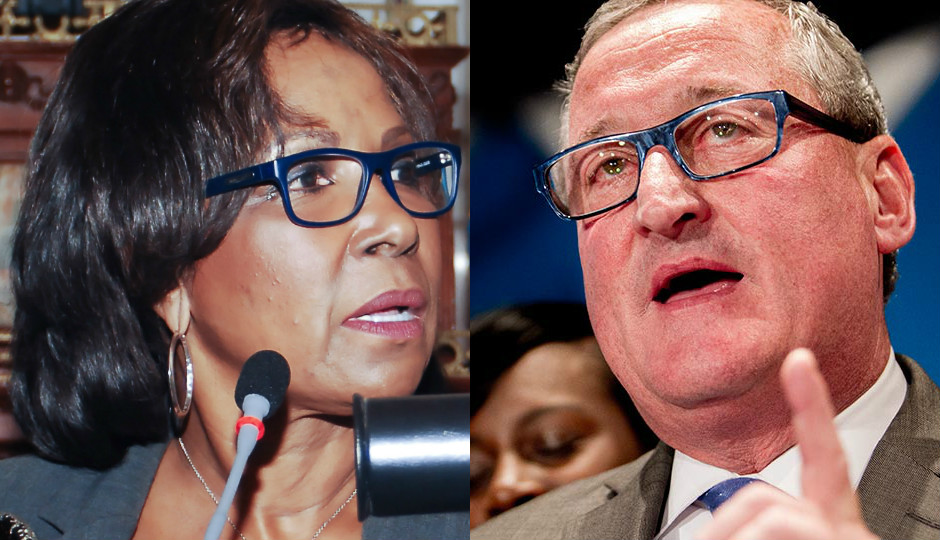Reynolds Brown: My Container Tax Is Less Regressive Than Kenney’s Soda Tax

L: Blondell Reynolds Brown (Photo courtesy of Philadelphia City Council) R: Jim Kenney (Photo by Jeff Fusco)
Councilwoman Blondell Reynolds Brown introduced a bill on Thursday that would create a 15-cent tax on beverage containers, as an alternative to Mayor Jim Kenney’s plan to tax soda in order to expand pre-K and fund community schools.
While the administration opposes the measure and still wants the soda tax, some soda tax opponents on Council already seem to be warming to the idea of a container tax.
“I think it’s less regressive in that it doesn’t single out one particular industry,” said Councilwoman Maria Quiñones-Sánchez, one of three members of Council who has announced that they are against the soda tax.
Sánchez previously said she wouldn’t support a soda tax at any rate — “regressive is regressive is regressive” — but said on Thursday that a container tax would have a more predictable revenue stream. “I think I could support it at 15 cents.”
On Wednesday, Council President Darrell Clarke sounded cautiously supportive of Reynolds Brown’s proposal. On Thursday, he was even more clear.
“I’m happy that the Councilwoman today introduced another measure that has worked, and a measure that makes sense to me in that it collects revenue across the board instead of one very narrowly targeted industry and source,” Clarke told reporters. “I like the provision, I like the level of details, and it’s something that I can possibly be supportive of.”
Clarke also hinted that his office has a few other proposals that might be “leaked” in the next few days, suggesting that a debate that has so far centered on a single tax is about to be opened up by a number of competing alternatives. He wouldn’t elaborate on what the proposals might be.
The Kenney administration said there is “no question” that Reynolds Brown’s proposal is more regressive than its own.
“While families can easily avoid the sugary drink tax, it is impossible to avoid a 15-cent container tax, which would be placed on water, health supplements and other necessities people buy every day,” Kenney spokeswoman Lauren Hitt said in an email.
The container tax proposal also drew criticism from Majority Leader Bobby Henon, who is thought to be a key supporter of the mayor’s proposed soda tax.
“Today, the introduction of the container tax proposal made the myth of the grocery tax a reality,” Henon said in a speech after Council’s weekly meeting, referring to the soda lobby’s disingenuous characterization of the the administration’s proposal as a tax on groceries.
Henon also said that a 15-cent container tax wouldn’t raise as much money as a 3-cent-per-ounce soda tax, and that Council should support the mayor’s plan to expand pre-K, create community schools, and rebuild parks and rec centers.
So far, most Council members have had no public disagreements with the mayor over his priorities, with everyone saying they share the same goals, if not the same ideas for how to achieve them. But on Thursday, Councilman David Oh raised a more fundamental question about the administration’s plans for expanding Pre-K.
“I’m not convinced at this point in time, although I am open-minded, about the pre-K program,” said Oh, who is a Republican. “So while there are people who are very satisfied with the pre-K program, and it is an important program, I don’t know what it is. And I certainly would like to know. I know it’s not universal, because we can’t afford it, and I don’t know what the curriculum is. I’d like to know what the curriculum is.”
Oh is not the only member of Council to raise questions lately about the mayor’s plans for expanding pre-K services. Clarke has suggested that the city could be more effective if it ran the program through the school district, rather than by setting up outside providers as the administration has proposed. On Thursday, Clarke went so far as to introduce a bill amending the mayor’s budget proposal by transferring $19 million to the school district that had been set aside for contracting with pre-K providers outside of the district. Clarke’s office said his proposal would allow the district to offer 2,000 additional pre-K seats starting this year, and 500 extra seats in each year thereafter.
For Reynolds Brown, who supports expanding pre-K and who served on a commission exploring how to make pre-K universal, the container tax is a matter of fairness. She said that the burden should fall on people who like to drink Perrier as much as on those who drink Coke.
“It doesn’t just hit the poorest of the poor,” Reynolds Brown said. “The net will be cast a lot wider. I’m for shared sacrifice, and this bill symbolizes that.”
Follow @JaredBrey on Twitter.